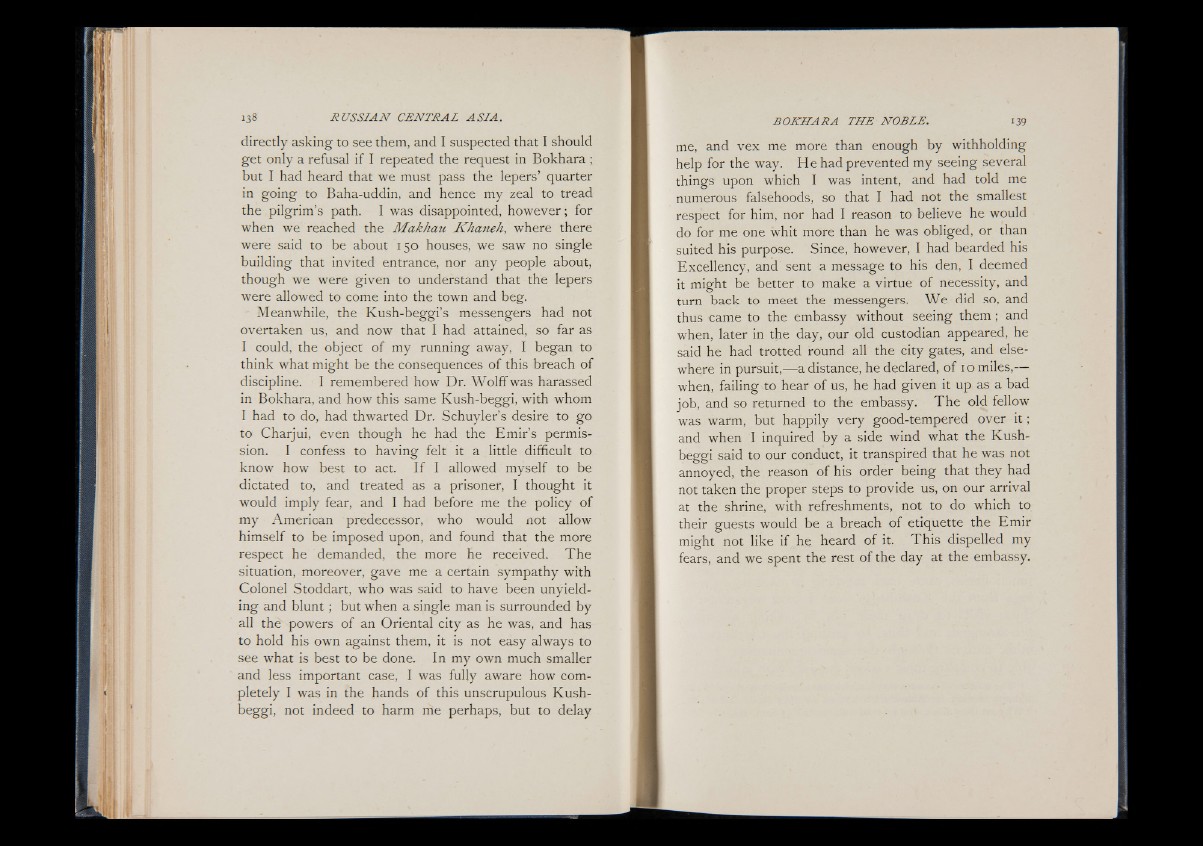
directly asking to see them, and I suspected that I should
get only a refusal if I repeated the request in Bokhara ;
but I had heard that we must pass the lepers’ quarter
in going to Baha-uddin, and hence my zeal to tread
the pilgrim’s path. I was disappointed, however; for
when we reached the Makhau Khaneh, where there
were said to be about 150 houses, we saw no single
building that invited entrance, nor any people about,
though we were given to understand that the lepers
were allowed to come into the town and beg.
Meanwhile, the Kush-beggi’s messengers had not
overtaken us, and now that I had attained, so far as
I could, the object of my running away, I began to
think what might be the consequences of this breach of
discipline. I remembered how Dr. Wolff was harassed
in Bokhara, and how this same Kush-beggi, with whom
I had to do, had thwarted Dr. Schuyler’s desire to go
to Charjui, even though he had the Emir’s permission.
I confess to having felt it a little difficult to
know how best to act. I f I allowed myself to be
dictated to, and treated as a prisoner, I thought it
would imply fear, and I had before me the policy of
my American predecessor, who would not allow
himself to be imposed upon, and found that the more
respect he demanded, the more he received. The
situation, moreover, gave me a certain sympathy with
Colonel Stoddart, who was said to have been unyielding
and b lu n t; but when a single man is surrounded by
all the' powers o f an Oriental city as he was, and has
to hold his own against them, it is not easy always to
see what is best to be done. In my own much smaller
and less important case, I was fully aware how completely
I was in the hands o f this unscrupulous Kush-
beggi, not indeed to harm me perhaps, but to delay
me, and vex me more than enough by withholding
help for the way. He had prevented my seeing several
things upon which I was intent, and had told me
numerous falsehoods, so that I had not the smallest
respect for him, nor had I reason to believe he would
do for me one whit more than he was obliged, or than
suited his purpose. Since, however, I had bearded his
Excellency, and sent a message to his den, I deemed
it might be better to make a virtue of necessity, and
turn back to meet the messengers. We did so, and
thus came to the embassy without seeing them ; and
when, later in the day, our old custodian appeared, he
said he had trotted round all the city gates, and elsewhere
in pursuit,— a distance, he declared, of 10 miles,—
when, failing to hear of us, he had given it up as a bad
job, and so returned to the embassy. T he old fellow
was warm, but happily very good-tempered over i t ;
and when I inquired by a side wind what the Kush-
beggi said to our conduct, it transpired that he was not
annoyed, the reason of his order being that they had
not taken the proper steps to provide us, on our arrival
at the shrine, with refreshments, not to do which to
their guests would be a breach of etiquette the Emir
might not like if he. heard of it. This dispelled my
fears, and we spent the rest of the day at the embassy.